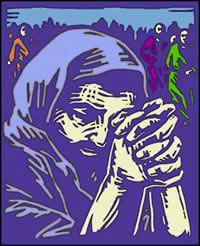
6th Sunday in Ordinary Time Year B
Jesus proclaimed the coming of the Kingdom, by preaching and by the healings that signalled the Kingdom’s mysterious coming in his own person.
Critical studies of the miracle narratives of the four gospels have produced important conclusions. They concern a relatively small number of events – about 30 in all. These narratives offer a distinct contrast to the characteristics of typical ‘wonder stories’. Though part of the Christian message from the beginning, they are constantly associated with a concern that they not give rise to a superficial popular enthusiasm, but be understood as signs of the coming of the Kingdom. We have already recognised the importance of this concern of Mark. His account of the healing of the leper, as Jesus begins his Galilean ministry presses home the point.
What a magnificent encounter with which to introduce the missionary journeys of Jesus. It would be hard to find a more telling symbol of the human miseries that Jesus was sent to overcome, than the plight of the leper who threw himself at the feet of Jesus – ‘If you want to you can cure me’. It was a situation produced in large part by human ignorance and fear, accentuated by traditions of ritual cleanness. Our first reading from Leviticus describes this pathetic condition in graphic detail – obliged to wear torn clothes, with hair dishevelled, and sounding the warning cry, ‘Unclean!’, that ostracised the leper from normal society. What the biblical writings called ‘leprosy’ included not only the dread Hansen’s disease, but many other skin disorders, many of which modern medicine recognises not to be contagious.
As the Saviour is moved with compassion in the presence of this human misery, we are reminded that the Servant of God of the late Isaian writings, who embodied God’s saving designs, by ‘bearing the sorrows’ of the people, is described as assuming the condition of a leper – ‘Despised, familiar with suffering, one from whom we averted our gaze’ (Is 53:3). In fact, Jesus made an astounding gesture of solidarity with the man in his misery. As he healed the leper with his word of prophetic authority, he ‘stretched out his hand and touched him’. In doing so, according to the Law, he had made himself ritually unclean.
Those who claimed the power of healing were not uncommon in the world in which Jesus lived. Being seen as one of their number could seriously compromise the evangelising mission that had been so tellingly expressed in the healing of the leper. Jesus urged the man, therefore, to go off quietly, fulfilling the Law’s prescription by having the priests verify his cure. But the man who had been cured could not contain himself. So important, however was it to Jesus – that the notoriety his healing had attracted be minimised – that he was forced to keep away from the towns. Nevertheless, the people were still drawn to him – Who is this man?
John Thornhill sm

